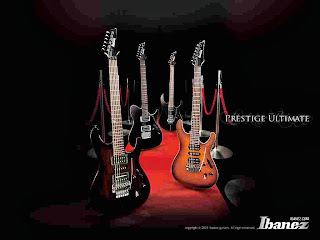Jackson Guitar
About Jackson :
Jackson guitars and basses have contributed an important chapter to the history of heavy metal. The popularity of these guitars exploded during the late '70s and early '80s as a new breed of guitarists came of age during the MTV era. Founder, Grover Jackson and his team of skilled craftsmen developed heavy rock-friendly guitars for these artists lusting after new loud and heavy sounds. Jackson answered the call delivering guitars and basses that have integrated into every sonic mutation of punk, hard rock, and metal including thrash metal, speed metal, death metal, goth, industrial, nu metal, skate metal, grunge, metalcore, rap metal, and more.
Jackson is based in the USA and its custom shop is one of the longest-operating facilities of its kind in the world. Jackson comes by this legacy naturally; the company got its start as a custom shop, employing the talents of open-minded and professional luthiers who had the freedom to dream up outlandish instruments and make their designs a reality. Today the company continues to flourish, providing world-class, high-performance instruments perfect for heavy, aggressive music.
Jackson guitars and basses have contributed an important chapter to the history of heavy metal. The popularity of these guitars exploded during the late '70s and early '80s as a new breed of guitarists came of age during the MTV era. Founder, Grover Jackson and his team of skilled craftsmen developed heavy rock-friendly guitars for these artists lusting after new loud and heavy sounds. Jackson answered the call delivering guitars and basses that have integrated into every sonic mutation of punk, hard rock, and metal including thrash metal, speed metal, death metal, goth, industrial, nu metal, skate metal, grunge, metalcore, rap metal, and more.
Jackson is based in the USA and its custom shop is one of the longest-operating facilities of its kind in the world. Jackson comes by this legacy naturally; the company got its start as a custom shop, employing the talents of open-minded and professional luthiers who had the freedom to dream up outlandish instruments and make their designs a reality. Today the company continues to flourish, providing world-class, high-performance instruments perfect for heavy, aggressive music.
Jackson's high-performance shred machines possess distinguishing features that set them apart from other guitars and basses. Two such features are the trademark "shark fin" fret inlays and compound-radius fingerboard that curves more dramatically at the nut for easier chording and low-action bends. Almost all of their axes feature pointy, drooped headstocks, originally designed by legendary rock icon Randy Rhoads who first collaborated with the company on his signature guitar in 1980. Rhoads and Grover Jackson sketched out the guitar design on a paper napkin and eventually it became the timeless classic Jackson Rhoads guitar, an instrument still revered and credited as the wellspring of Jackson's bloodline.
Building on the success of the Randy Rhoads signature guitar, the company has worked with several phenomenally talented metal guitarists to develop signature instruments that emphasize the uniqueness of each player. Today, Jackson instruments bear the names of musicians such as Phil Collen from Def Leppard, Mark Morton and John Campbell from Lamb of God, Phil Demmel from Machine Head, Chris Beattie from Hatebreed, Adrian Smith from Iron Maiden, and Matt Tuck from Bullet For My Valentine to name a few.
Related : Jackson Guitar





